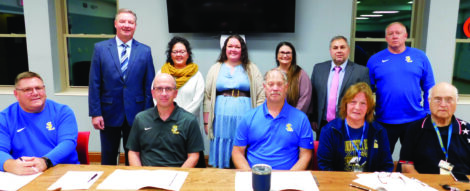Norfolk Southern moves to block expert testimony in DOJ case
EAST PALESTINE — Norfolk Southern has filed a series of motions in federal court seeking to exclude expert testimony presented by the State of Ohio and the United States as litigation continues over the 2023 train derailment. The filings came last week in Youngstown’s Northern District of Ohio, where a proposed $315 million federal settlement between the railroad and the Department of Justice remains pending.
The railroad is asking the court to block testimony from several of Ohio’s experts, arguing they lack proper qualifications, relied on unreliable methods or failed to link their opinions to evidence. Three of the challenged witnesses are medical doctors whose testimony supports Ohio’s push for a long-term medical monitoring program for residents affected by the derailment.
Norfolk Southern says the opinions of Dr. Ann Jones, Dr. Marek Greer and Dr. Alan Ducatman fail to meet scientific and legal standards under the Daubert rule and Federal Rule of Evidence 702. The company argues that Jones relied on unsupported assumptions to project medical and community-outreach costs, and that Ohio has not shown a causal connection between the derailment and the health expenses she cites. Greer’s medical-monitoring proposals, the company says, draw from generic programs and fail to address exposure levels tied to the incident. Norfolk Southern also targets Ducatman’s testimony, saying his conclusions about health effects rely on hearsay, self-reported surveys and unsubstantiated claims.
The Daubert standard and Rule 702 govern the use of expert testimony in federal court. Under Rule 702, an expert may testify only if they are qualified and their opinions are based on solid data, use reliable methods and apply those methods properly. Daubert adds that courts should consider whether an expert’s approach can be tested, has been peer-reviewed, has a known error rate and is generally accepted in the scientific community.
Norfolk Southern argues Ohio has not produced evidence of exposure or causation needed to support any of the medical experts’ conclusions.
The company is also challenging the testimony of three additional experts. It says Geoffrey Reeder and Timothy O’Brien are not qualified in mechanical inspections or wayside detection systems and relied on inadmissible evidence while offering improper opinions about the company’s state of mind. The railroad further seeks to exclude cost-damage expert Robert Unsworth, arguing he relied entirely on information from an undisclosed source without independently verifying it, making his analysis unreliable under Daubert and Rule 702.
In a separate motion, Norfolk Southern asked the court to strike two pieces of evidence submitted by Ohio — Dr. Jones’ declaration and a new Ohio EPA incident-investigation report. The company says Jones’ declaration amounts to undisclosed expert testimony and relies on selective data that omits key “non-detect” results. It also argues the state failed to provide the underlying records needed to verify the summary.
Norfolk Southern claims the Ohio EPA report was disclosed too late and appears tailored for litigation, saying the state withheld photographs and data for more than two years.
Ohio Attorney General Dave Yost disputes the railroad’s claims. He says Jones’ chart summarizing seven analytes at the derailment site is a permissible summary of voluminous data under Rule 1006 and not an expert opinion. Yost also says the Ohio EPA report was prepared according to standard procedures and provided promptly after completion, noting that Norfolk Southern had access to the underlying data throughout the case.
The dispute comes as the Justice Department seeks final approval of a sweeping environmental settlement announced in May 2024. The agreement would require Norfolk Southern to complete cleanup efforts, reimburse the EPA more than $900 million, contribute $25 million for medical and mental-health services and adopt new safety measures, including improved track monitoring and safer tank cars.
Yost immediately criticized the proposed deal as premature, arguing it was reached before the National Transportation Safety Board issued its final findings and that it may not fully compensate residents.
Two Ohio residents, Robert Figley and Barbara Adams, have also moved to intervene in the case. Figley, a local business owner, and Adams, a nearby resident, say the derailment directly harmed their properties, health and livelihoods. They argue the proposed consent decree does not adequately address long-term environmental and health impacts.
The United States was initially required to respond to the motion to intervene by Dec. 1. Citing the Thanksgiving holiday and the complexity of the filing, federal attorneys requested, and all parties consented to, a two-week extension. The new deadline for opposition briefs is Dec. 15.
The federal judge overseeing the case has not yet ruled on any of the pending motions or the settlement.

